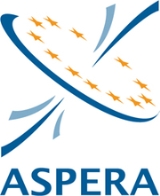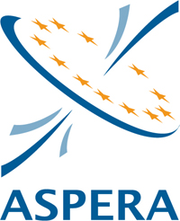
Aspera European Astroparticle network
Encyclopedia

ASPERA is a network of national government agencies responsible for coordinating and funding national research efforts in Astroparticle Physics
Astroparticle physics
Astroparticle physics, the same as particle astrophysics, is that branch of particle physics that studies elementary particles of astronomical origin, and their relation to astrophysics and cosmology. It is a relatively new field of research emerging at the intersection of particle physics,...
.
ASPERA started in July 2006 and is funded by the European Commission
European Commission
The European Commission is the executive body of the European Union. The body is responsible for proposing legislation, implementing decisions, upholding the Union's treaties and the general day-to-day running of the Union....
over a three year period.
One of the most important achievements of ASPERA was to produce a common European Roadmap for the future, in the field of astroparticle physics.
Published in September 2008 in Brussels, the Roadmap presents the "Magnificent Seven", which are the Seven large infrastructures expected in the next 10 years to answer some of the most exciting questions about the Universe such as: What is dark matter? What is the origin of cosmic rays? What is the role of violent cosmic processes? Can we detect gravitational waves?
- CTA, The Cherenkov Telescope ArrayCherenkov Telescope ArrayThe Cherenkov Telescope Array or CTA is a project to build a new generation ground-based gamma-ray instrument in the energy range extending from some tens of GeV to above 100 TeV...
, a large array of Cherenkov Telescopes for detection of cosmic high-energy gamma rays - KM3NeTKm3netKM3NeT, an acronym for Cubic Kilometre Neutrino Telescope, is a future European research infrastructure which will be located at the bottom of the Mediterranean Sea...
, a cubic kilometre-scale neutrino telescope in the Mediterranean Sea - Ton-scale detectors for dark matter searches, such as EURECA
- A ton-scale detector for the determination of the fundamental nature and mass of neutrinos
- A Megaton-scale detector for proton decay’s search, neutrino astrophysics & investigation of neutrino properties
- A large array for the detection of charged cosmic rays
- A third-generation underground gravitational antenna
ASPERA comprises the following agencies: FNRS
NFWO
The National Fund for Scientific Research is a government institution in Belgium for supporting scientific research...
(Belgium), FWO
NFWO
The National Fund for Scientific Research is a government institution in Belgium for supporting scientific research...
(Belgium), MEYS
Meys
Meys is a commune in the Rhône department in eastern France....
(Czech Republic), CEA
Commissariat à l'Énergie Atomique
The Commissariat à l'énergie atomique et aux énergies alternatives or CEA, is a French “public establishment related to industrial and commercial activities” whose mission is to develop all applications of nuclear power, both civilian and military...
(France), CNRS (France), BMBF (Germany), PTDESY (Germany), DEMOKRITOS (Greece), INFN (Italy), FOM
AMOLF
AMOLF, also known by its full name as FOM Institute AMOLF is one of the three research institutes operated by the Dutch Foundation for Fundamental Research on Matter, also known as FOM. The institute is one of the leading research institute in Europe in the field of physics and biological physics...
(Netherlands), FCT
Fundação para a Ciência e Tecnologia
The Foundation for Science and Technology , FCT, is an organization within the Ministério da Ciência, Tecnologia e Ensino Superior in Portugal which funds scientific research activities, in particular in the areas of natural sciences, exact sciences, social sciences and humanities....
(Portugal), FECYT (Spain), MEC (Spain), SNF
Swiss National Science Foundation
The Swiss National Science Foundation is a science research support organization mandated by the Swiss Federal Government. The SNSF was established in 1952 as a foundation under private law. Its secretariat is based in Bern....
(Switzerland), VR (Sweden), STFC
Science and Technology Facilities Council
The Science and Technology Facilities Council is a UK government body that carries out civil research in science and engineering, and funds UK research in areas including particle physics, nuclear physics, space science and astronomy .-History:It was formed in April 2007 as a merger of the Particle...
(United Kingdom) and the European organization CERN
CERN
The European Organization for Nuclear Research , known as CERN , is an international organization whose purpose is to operate the world's largest particle physics laboratory, which is situated in the northwest suburbs of Geneva on the Franco–Swiss border...
.
ASPERA has come about through the existence of ApPEC which was founded in 2001 when six European scientific agencies took the initiative to coordinate and encourage Astroparticle Physics
Astroparticle physics
Astroparticle physics, the same as particle astrophysics, is that branch of particle physics that studies elementary particles of astronomical origin, and their relation to astrophysics and cosmology. It is a relatively new field of research emerging at the intersection of particle physics,...
in Europe.

